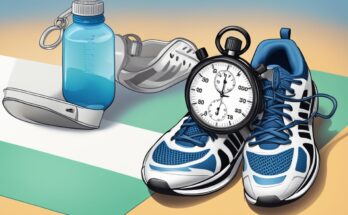Drinking coffee has become a popular pre-workout ritual for many runners. Some people believe that consuming caffeine before a run can help burn fat and improve performance. However, the question remains: does drinking coffee before running actually help burn fat?
Coffee is a popular source of caffeine, which is a natural stimulant that can increase metabolism and help the body burn fat. Caffeine works by stimulating the central nervous system, which can increase the production of adrenaline and help the body break down fat cells. Some studies have suggested that caffeine can increase fat oxidation during exercise, which may lead to increased fat burning.
Despite these potential benefits, the relationship between coffee, caffeine, and fat burning is not entirely clear. Some studies have found that caffeine can increase fat oxidation during exercise, while others have found no significant effects. Additionally, the effects of caffeine can vary depending on the individual, the amount consumed, and the timing of consumption.
The Science of Fat Burning
Fat Oxidation
Fat oxidation is the process of breaking down stored fat in the body to produce energy. When the body needs energy, it first uses the readily available glucose from the bloodstream and glycogen stored in muscles and liver. Once these sources are depleted, the body starts breaking down fat to produce energy. This process is important for endurance athletes who need to sustain energy levels for long periods.
Caffeine
Caffeine is a stimulant that is commonly found in coffee. It is known to improve athletic performance, aid in weight loss, and is often used as a pre-workout supplement. Caffeine works by blocking the adenosine receptors in the brain, which reduces the feeling of tiredness and increases alertness.
Studies have shown that caffeine can increase fat oxidation during exercise. A meta-analysis of 11 studies found that caffeine increased fat oxidation by an average of 16% during exercise. However, the effects of caffeine on fat oxidation are more pronounced in endurance athletes than in non-athletes.
Timing
The timing of caffeine intake is important for its fat-burning effects. Studies have shown that consuming caffeine before exercise can increase fat oxidation during exercise. However, consuming caffeine after exercise does not have the same effect.
The Food and Drug Administration recommends that adults consume no more than 400 milligrams of caffeine per day. Consuming too much caffeine can lead to anxiousness, headaches, upset stomach, jitters, and other side effects.
Regular Coffee vs. Espresso
Regular coffee and espresso contain similar amounts of caffeine per serving. However, espresso is often consumed in smaller quantities and has a higher concentration of caffeine per ounce. This means that a strong cup of coffee may have the same amount of caffeine as a shot of espresso.
Other Factors
Drinking coffee before running may help burn fat, but it is not a magic solution. Other factors such as diet, nutrients, and timing of meals also play a role in fat burning. Consuming dairy or food before exercise can cause stomach discomfort and affect the digestive system, which may hinder fat burning.
A study conducted by the University of Granada and published in the Journal of the International Society of Sports Nutrition found that consuming a snack before exercise did not affect fat oxidation during exercise. However, consuming a high-carbohydrate meal before exercise reduced fat oxidation during exercise.
In conclusion, drinking coffee before running may help burn fat, but it is important to consider other factors such as timing, nutrients, and the effects of caffeine on the nervous system and muscles. It is also important to consume caffeine in moderation and consult with a healthcare professional before consuming caffeine while pregnant or as a post-workout supplement.
The Effects of Caffeine on Performance
Caffeine is one of the most widely consumed stimulants in the world, and it has been shown to have a number of effects on performance. This section will explore the effects of caffeine on endurance and strength training.
Caffeine and Endurance
Research has shown that caffeine can improve endurance performance. It does this by increasing the availability of fatty acids, which the body can use as fuel. This means that the body is able to spare glycogen, which is stored in the muscles and liver and is used for energy during exercise.
Caffeine can also improve the perception of effort during exercise, which can help athletes push harder and for longer periods of time. Additionally, caffeine has been shown to increase alertness and focus, which can be beneficial during long endurance events.
However, it is important to note that caffeine can have negative side effects, such as insomnia, nervousness, and increased heart rate. It is also important to consider individual differences in caffeine sensitivity and to be mindful of caffeine dosage.
Caffeine and Strength Training
Caffeine has also been shown to have benefits for strength training. It can increase power output and reduce the perception of pain during exercise. This means that athletes may be able to lift heavier weights and perform more repetitions.
However, it is important to note that caffeine may not be as effective for short-duration, high-intensity exercises, such as sprinting or jumping. Additionally, there is limited research on the effects of caffeine on strength training in women.
Overall, caffeine can have positive effects on exercise performance, but it is important to consider individual differences in caffeine sensitivity and to be mindful of dosage. Athletes should also be aware of the potential negative side effects of caffeine consumption, such as sleep disruption and increased heart rate.
Drinking Coffee Before Running
Drinking coffee before running has been a popular practice among runners for many years. It is believed that caffeine can help to increase energy levels, improve endurance, and promote fat burning during exercise. However, there are several factors to consider before deciding to drink coffee before running.
Factors to Consider
Caffeine Sensitivity
Individuals who are sensitive to caffeine may experience negative side effects such as nervousness, irritability, increased heart rate, and sleep disruption. It is important to consider one’s caffeine tolerance level before consuming coffee before running.
Gastroesophageal Reflux Disease (GERD)
For individuals with GERD, drinking coffee before running may exacerbate symptoms such as heartburn and acid reflux. It is recommended to avoid coffee and other acidic foods and beverages before exercise for those with GERD.
Perception of Effort
While caffeine can help to increase energy levels, it may also alter the perception of effort during exercise. This can lead to a decrease in perceived exertion, causing individuals to overexert themselves and potentially leading to injury.
Benefits
Improved Endurance
Caffeine has been shown to improve endurance during exercise by reducing the perception of fatigue and increasing the use of fat as a fuel source. This can lead to improved performance during long-distance running.
Fat Burning
Caffeine has also been shown to increase the rate of fat burning during exercise. This can lead to improved body composition and weight loss.
Mood
Coffee consumption has been linked to improved mood and cognitive function. This can lead to a more positive exercise experience and improved motivation during running.
Risks
Seizures
Individuals with a history of seizures should avoid consuming caffeine before exercise, as it may increase the risk of seizure activity.
Tremors
Consuming large amounts of caffeine can cause tremors or shaking, which can impair running performance and potentially lead to injury.
Fast Heart Rate
Caffeine consumption can cause a fast heart rate, which can be dangerous for individuals with underlying heart conditions.
In conclusion, drinking coffee before running can have both benefits and risks. It is important to consider individual factors such as caffeine sensitivity, GERD, and perception of effort before deciding to consume coffee before exercise. While caffeine can improve endurance and promote fat burning, it can also lead to negative side effects such as seizures, tremors, and fast heart rate.




